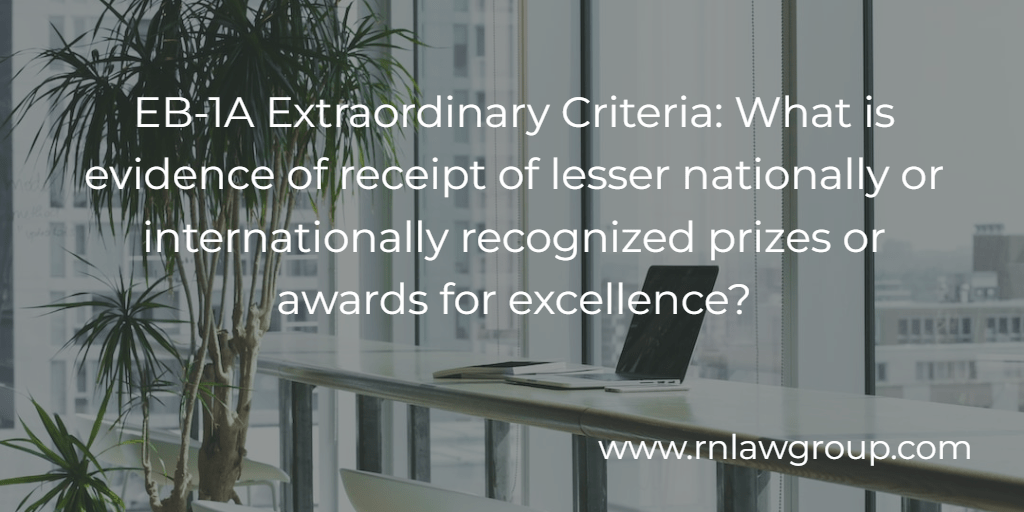
EB-1A Extraordinary Criteria: What is evidence of receipt of lesser nationally or internationally recognized prizes or awards for excellence?
The EB-1A employment-based immigration visa can appear to be a daunting process. An applicant must either show proof of a one-time achievement (major internationally-recognized award) meet 3 of the 10 listed criteria:
- Evidence of receipt of lesser nationally or internationally recognized prizes or awards for excellence
- Evidence of your membership in associations in the field which demand outstanding achievement of their members
- Evidence of published material about you in professional or major trade publications or other major media
- Evidence that you have been asked to judge the work of others, either individually or on a panel
- Evidence of your original scientific, scholarly, artistic, athletic, or business-related contributions of major significance to the field
- Evidence of your authorship of scholarly articles in professional or major trade publications or other major media
- Evidence that your work has been displayed at artistic exhibitions or showcases
- Evidence of your performance of a leading or critical role in distinguished organizations
- Evidence that you command a high salary or other significantly high remuneration in relation to others in the field
- Evidence of your commercial successes in the performing arts
These criteria can make even very well qualified candidates nervous about their eligibility, but with the right experience, the right lawyer, and a little luck, an applicant can have their Green Card in as little as three months. This series of articles will provide a background on each of the 10 criteria, examples of documents that can meet them, and common pitfalls to avoid.
To qualify for the receipt of lesser nationally or internationally recognized prizes or awards for excellence, the honors or awards must be nationally or internationally renowned and should honor excellence in the field in order to satisfy the EB-1A requirements. Even if the word “lesser” implies that the accolades may not be at the highest degree of recognition, they must nonetheless be significant in the field in question. The following are frequently required as proof of these awards:
- Prestige: The prizes must be given by prestigious and well-respected associations, institutions, or organizations that are known for their meticulous selection procedures.
- Selectivity: The awarding organizations should have stringent requirements for eligibility, requiring exceptional contributions or achievements.
- Scope: To show recognition beyond regional or local levels, the awards should have a large reach, either nationally or internationally.
- Evaluation Procedure: To ensure that the awards have merit and credibility in the industry, the selection procedure should include objective and expert reviews.
Awards that fit the criteria, for example:
- Award for a Scholarly Article or Book: An honor given to a person for their outstanding work in research or writing in a particular field, acknowledged by a professional association or academic institution.
- Award for Best Paper or Poster Presentation at a Notable Conference: This honor recognizes the presenter’s accomplishments and contributions to the field.
- Fellowship: A distinguished award given by a well-known institution or foundation that denotes extraordinary performance or the potential for future contributions.
- Recognition by a Government Agency or a Professional Association: This acknowledgement by a Government Agency or a Professional Association highlights the individual’s competence and effect on the field.
- Research Grant or Award: Money or assistance for research given by recognized organizations or foundations as a symbol of appreciation for the researcher’s potential and efforts.
- Awarded for remarkable leadership or service in the field, with emphasis on the recipient’s influence and impact on the community.
- Award given for creative research or product creation, highlighting the recipient’s distinctive accomplishments and influence on the area.
- Award for Excellence in Teaching or Mentoring: This honor recognizes the recipient’s outstanding performance in teaching or mentoring, showcasing their capacity to share knowledge and have a good influence on others.
- Awards for excellent artistic accomplishments, such as those given for a film, a piece of music, or other creative works, are given to recognize the talent and skill of the recipient.
- Exceptional athletic prowess is demonstrated by receiving an athletic achievement award, such as a medal in a prominent international competition.
Evidence Required as Proof:
- It is important to include documentation that demonstrates the importance and acknowledgment of awards when providing proof of receiving smaller prizes or medals for excellence. The following proof might be needed:
- Copies of the official award certificates or letters that clearly state the recipient’s name, the awarding organization, the award’s requirements, and the degree of recognition received are known as award certificates or letters.
- Strong letters of support from authorities or professionals in the field that witness to the importance of the award, the standing of the organization giving it, and the relevance of the recipient’s accomplishments.
- Coverage in the media: articles, news releases.
Common difficulties and issues that may come up during the Request for Evidence (RFE) phase of the EB-1A visa application include the following:
- Lack of Adequate Documentation: One of the most frequent mistakes is failing to offer adequate proof or documentation to support the importance and acknowledgment of the awards. It is essential to provide comprehensive details regarding the awarding organization, the selection procedure, and the qualifying requirements.
- Insufficient Justification of the Award’s Importance: The adjudicating officer may ask for more information about the significance of the award in relation to the particular field. It is imperative to describe how the award is recognized on a national or international level and how it exemplifies greatness in the field.
- Lack of Expert Opinion: RFEs may ask for further expert opinion letters from people who are well-known in the industry. The claim that the awards are nationally or internationally renowned and show outstanding talent should be supported by these letters’ in-depth study.
- Insufficient Selectivity Documentation: If the selectivity of the awarding organization is not sufficiently documented, an RFE may doubt the strictness of the selection procedure. This problem can be solved by providing information on the organization’s reputation, the quantity of applications, and the selection criteria.
- Insufficient Field Information: RFEs may ask for more details regarding the field in which the applicant is exhibiting outstanding aptitude. This could demonstrate the importance of the field, recent developments, and the effect of the individual’s work.
- Lack of Support: In some circumstances, an RFE may raise concerns about the legitimacy or veracity of the awards. These issues can be addressed by offering more proof, such as quotes from others, testimonials, or independent verification of the prizes.
- Older or Inapplicable Awards: An RFE may ask for more recent or field-specific awards to demonstrate a person’s present remarkable ability if the ones offered are old or unrelated to their accomplishments or area.
- Insufficient Justification of the Field’s Importance: The adjudicating officer could need more explanation of the field’s significance. It is crucial to discuss the field’s significance, recent developments, and individual contributions in the context of the overall field.
- Lack of Context: RFEs could raise concerns about the degree of competition or the importance of the award in the context of the field. These issues can be addressed by providing comparative facts, such as the quantity of applicants, acceptance rates, or expert testimonials.
- RFEs may be issued as a result of any anomalies or inconsistencies in the application materials or supporting papers. It is essential to make sure that the application is accurate and consistent throughout.
When responding to an RFE, it’s crucial to pay close attention to every point stated, offer more information or explanation as needed, and make sure the response clearly displays the person’s exceptional skill and standing in their industry. In order to successfully navigate the RFE process and write a compelling answer, it can be helpful to consult with an experienced immigration lawyer.
By: Karim Jivani
Karim Jivani is a Special Attention Staff Attorney at Reddy Neumann Brown PC who focuses on employment-based non-immigrant visas. Karim’s practice covers all phases of the visa process including filing petitions, responding to Requests for Evidence (RFE), and drafting motions and appeals. He has completed over 30 RFE’s to date in response to H-1B, L-1, I-140, and VAWA petitions.

